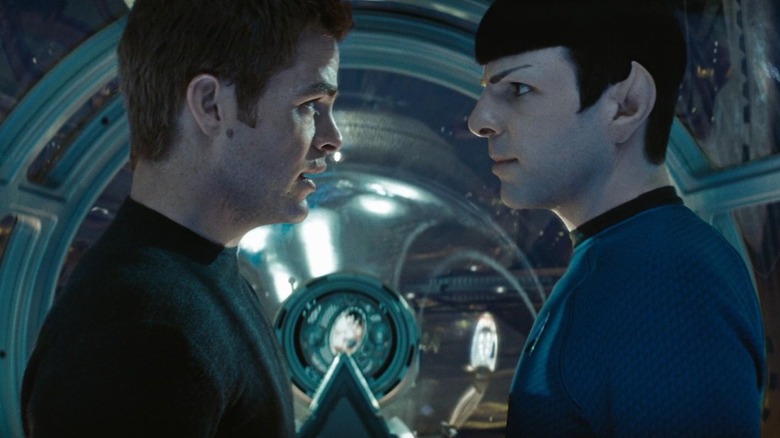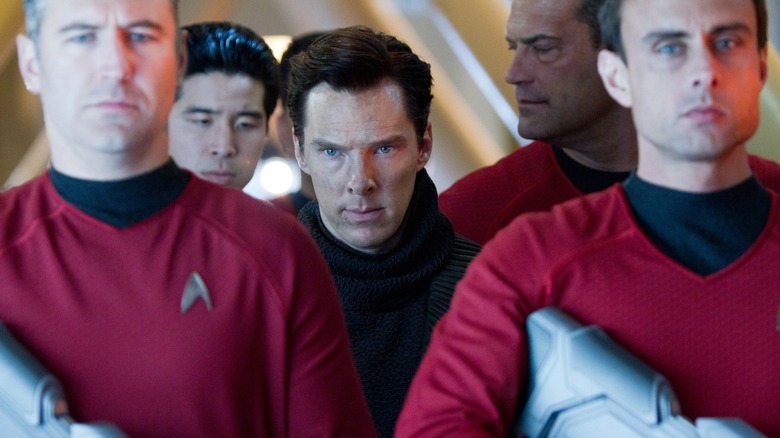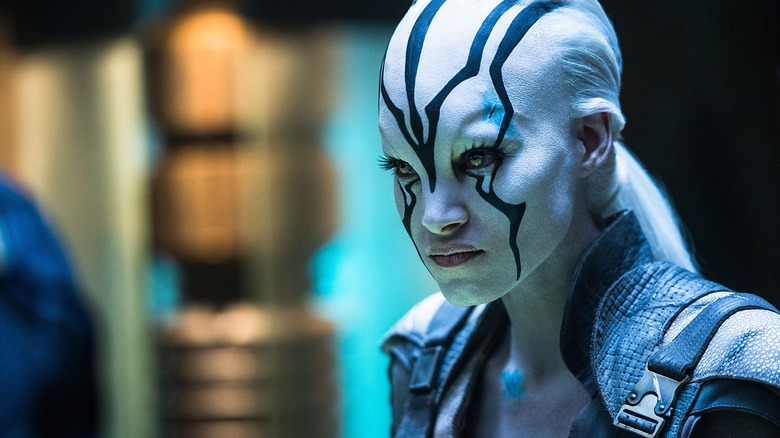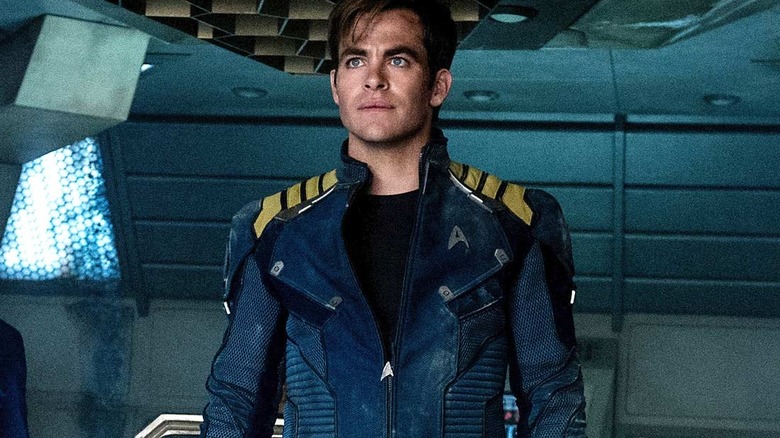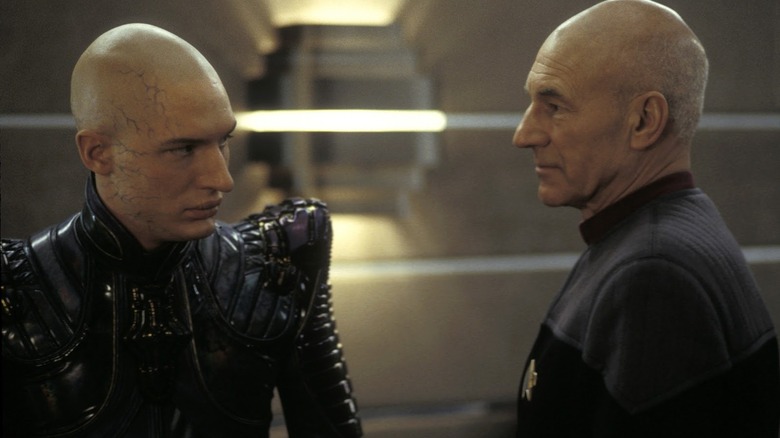How Paramount Pictures Has Completely Bungled The Star Trek Film Franchise's Potential
On February 1, 2004, Janet Jackson and Justin Timberlake performed live at the halftime show of Super Bowl XXXVIII. The duo performed Timberlake's song "Rock Your Body" and gyrated suggestively. Then, as had been choreographed, Timberlake removed a piece of Jackson's costume, intending to reveal her bustier. He, however, accidentally pulled off too much of said costume. Jackson was exposed for half of a second, but it scandalized the world, and the phrase "wardrobe malfunction" immediately entered the lexicon. Many late-night talk show hosts were eager to joke about it, and some media watchdog groups clucked their tongues in disapproval.
CBS, who broadcast the Super Bowl, was ultimately not charged any fines, nor was MTV who produced it, although MTV was banned from producing any further halftime shows. The scandal caused a schism within Viacom, CBS' and MTV's parent company. Les Moonves, head of the CBS side, began to develop increasing shared animosity toward Tom Freston, head of MTV. Viacom head Sumner Redstone decided to split up his bickering children, with Moonves inheriting one half (CBS, Simon and Shuster, Showtime, the WB, the CW) and Freston inheriting the other (MTV, BET, Paramount Pictures).
"Star Trek" was, up to that point, kept entirely under the Viacom umbrella. The split caused the "Star Trek" TV rights to land on the CBS side and the movie rights to land on the Paramount side.
This caused no small amount of headaches.
Trekking into darkness
"Star Trek" was too tasty a property for either CBS or Paramount to let lay fallow, and each side tried to exploit "Trek" to the best of their abilities. Paramount, who owned the movie rights to "Trek" but not its TV rights, had to essentially license "Trek" from CBS in order to make a new movie. Some hidden legalese, however, prevented Paramount from using the characters and iconography from the show, forcing them to make something that was legally distinct. Their solution was a parallel timeline — the Kelvin timeline — wherein familiar characters were played by new actors, uniforms were slightly different, and the U.S.S. Enterprise was redesigned. That was J.J. Abrams' "Star Trek," released in 2009.
CBS, meanwhile, took the opportunity to market the living bejesus out "Trek," distributing as many shows as they could to whatever streaming platform would have them. It also meant a new glut of "Star Trek" DVDs and Blu-rays, some of them having been meticulously remastered. Eventually, in 2017, CBS launched its own streaming service — CBS All Access — and began making new "Star Trek" shows in the original timeline. Paramount made three Kelvin "Star Trek" movies from 2009 to 2016.
In short, we have Janet Jackson's wardrobe malfunction to thank for the sheer volume of "Star Trek" we have today.
Viacom would eventually re-merge in 2019, allowing sticklers for "Trek" continuity to breathe a sigh of relief. There was no longer a need to keep track of a parallel timeline. But, it might be said, the damage was already done.
Is Star Trek an action franchise?
Abrams' "Star Trek" was a massive hit and, as Trekkies will hasten to point out, dramatically changed the tone of the franchise. "Trek" movies had rarely really skewed toward action, with "Star Trek: The Motion Picture" being a heady contemplation on the nature of consciousness and the meaning of existence. "Star Trek II" featured a more simplified revenge story, but that film's final battle sequence was more like a stealthy submarine battle than a fast-paced dogfight. "Star Trek III" was about sacrifice and loss, and "Star Trek IV" was a fish-out-of-water comedy. When William Shatner directed a horseback rescue in "Star Trek V," it was largely embarrassing, and "Star Trek VI" was a sociopolitical thriller. It wasn't until the latter-day movies based on "Star Trek: The Next Generation" that action became the movies' default subgenre.
"Star Trek" '09 — seven years after "Star Trek: Nemesis" and five years after the cancelation of "Star Trek: Enterprise" — was an action picture through and through. It borrowed the "bad guy wants revenge" plot from "Star Trek II," and expanded it with more violence. The characters were younger, hotter, more impulsive, and more given to heightened emotions. The new "Star Trek" was more explicitly about battles, confrontations, and violence. Gone were quiet scenes of adult crews gathering in observation lounges and discussing their options to solve an ethical crisis.
One can argue all day — in a gatekeeping sort of way — as to whether or not the Kelvin movie counted as "real 'Trek,'" but regardless it was a massive success. Its 2013 follow-up, the even more violent, vengeance-based thriller "Star Trek Into Darkness," was likewise a hit. The 2016 film "Star Trek Beyond" was less popular, and it's easy to see why: "Trek" couldn't compete with "Star Wars."
Trek vs. Wars, ad infinitum
Also laying dormant for a decade was "Star Wars."
There hadn't been a "Star Wars" feature film since 2005 with the release of "Star Wars: Episode III – Revenge of the Sith," and the series was seemingly at an end. Audiences' appetites for high-octane space battles remained, however, and "Star Trek," in being so action-oriented, certainly fulfilled a certain itch. In the mid-2010s, Disney — after purchasing Lucasfilm — put new "Star Wars" films into production almost immediately. "Star Wars: The Force Awakens" was released in 2015, and it was a bigger hit than anyone could have imagined.
After "Star Wars" was back, "Star Trek Beyond," released the following year, could no longer fulfill its function as a "Star Wars" stand-in. It wasn't as big a hit as Paramount wanted, and the series more or less came to a halt (despite constant half-starts on a fourth film, as well as a completely separate script by Quentin Tarantino).
In 2022, one might be able to see Paramount's folly from the start. Despite the popularity of "Star Trek" (2009) and "Star Trek Into Darkness," the franchise was never well-suited for action. So eager was Paramount to make a "Star Trek" movie, that they charged ahead into mainstream action territory, rather than bide their time and return with a film that could legally take place within the canon. Many Trekkies would likely have appreciated a slower, more thoughtful epic about life on Deep Space Nine a decade after the events of the show, perhaps. Feature films would have been a great way to showcase the elderly Jean-Luc Picard before the pretty awful "Star Trek: Picard" could louse that up on its own.
A time for everything
When CBS All Access launched in 2017, their new vision of "Star Trek" was also, perhaps thanks to the Kelvin films, very action-forward. "Star Trek: Discovery" began with wars and battles and betrayals and sex and oh so much violence. It was a hard-edged, high-octane program that also didn't resemble any of the "Trek" that came before it. Characters were now evil and impulsive, with even the "good" characters committing murder on the regular. This darkness bled into "Star Trek: Picard" as well, another program that foregrounded murder. The tone of the franchise had been changed. Some Trekkies felt it was all beyond repair.
Ironically, the Kelvin "Star Trek" movies were likely what kept the public's interest in the franchise alive from 2006 to 2019. When Viacom re-merged and CBS All Access became Paramount+, "Trek" began to shift back to something more thoughtful, upbeat, episodic, and traditional. "Star Trek: Lower Decks" and "Star Trek: Strange New Worlds" seemed to understand the tone and optimism of the franchise better than anything that had come in the previous 20 years.
Paramount's insistence on making an audience-pleasing action-based revenge movie seemed like a good idea at the time — and it worked for a while — but it was precluded by the absence of new "Star Wars" films, and the continued separation of "Trek" movies and TV shows. Now that "Star Wars" is everywhere and Paramount is whole, there is no place for a Kelvin movie. It couldn't last. There wasn't enough wit or heady, sci-fi ideas to keep it going.
When you double down on action, someone will always be able to outdo you. It was a missed opportunity.
